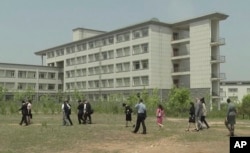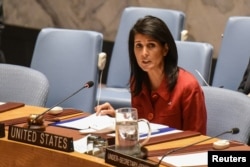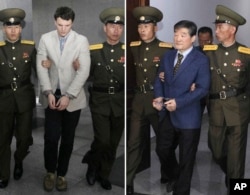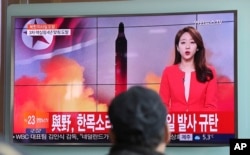The release of the now three Americans being detained in North Korea seems unlikely in the near future as Washington and Pyongyang move closer to the brink of conflict over the growing nuclear threat on the Korean Peninsula.
Korean-American Kim Sang Duk, also known as Tony Kim, became the third American to be held in North Korea, when he was arrested Saturday at the Pyongyang International Airport as he was trying to leave the country.
The 58-year-old Kim was teaching accounting at the Pyongyang University of Science and Technology (PUST,) a private university funded mostly by Western-based Evangelical Christians groups that educates the children of the country's elite.
Bargaining chips
Nikki Haley, the U.S. ambassador to the United Nations, on Monday said Kim’s arrest is an attempt by the “flailing” Kim Jong Un government to gain some leverage to deal with the Untied States over its nuclear and missile programs.
The Swedish Embassy in Pyongyang confirmed Kim’s arrest but North Korea has not yet publicly charged him. A PUST official told the Reuters News Agency that Kim’s arrest was not related to his work at the university but suggested it might be connected to his outside volunteer activity at a local orphanage. In the past North Korea has arrested a number of missionaries for violating a ban on proselytizing that is considered a crime against the state.
Nicholas Burns, a former U.S. undersecretary of state said, “The North Koreans have a history of taking American citizens hostage, detaining them illegally and without any rationale. They obviously do this in order to up the ante on the United States and perhaps have something to negotiate with the United States.”
Last year, North Korea arrested Otto Warmbier just days before conducting its fourth nuclear test in January 2016. The U.S. college student was later sentenced to 15 years of hard labor for trying to steal a political banner from his hotel in Pyongyang. It later sentenced American missionary Kim Dong-chul to 10 years’ hard labor on charges of spying and other offenses.
Back channel dialogue
Haley said the U.S. will work on securing the release of the Americans being held in North Korea, but was vague as to what course of action Washington might pursue.
Previous American detainees have been released after a few months, following visits from high-profile Americans, including former presidents Bill Clinton and Jimmy Carter.
But since North Korea conducted its fourth nuclear test in January 2016, neither Washington nor Pyongyang seem willing to make any conciliatory gestures. Under former President Barack Obama the U.S. rallied international support for increased sanctions against the Kim government.
Pyongyang responded by accelerating nuclear and ballistic missile tests.
President Donald Trump has further increased pressure by emphasizing possible military strikes to prevent North Korea from developing an intercontinental ballistic missile capable of striking the U.S. mainland.
Phil Robertson, the deputy Asia director of the advocacy group Human Rights Watch said Washington needs to find some back channel way to establish a working dialogue with Pyongyang to negotiate the release of these individuals who have become pawns in this international nuclear standoff.
“Clearly we’ve got to do more. The United States has got to find a way to get these people out as a matter of priority,” said Robertson.
Refugees
Trump has emphasized that China needs to play a stronger role in restraining North Korea.
Robertson said Beijing could send a strong message to Kim Jong Un by allowing more North Korean refugees to escape through China to a third country like South Korea.
“If China really wants to put a lot of pressure on North Korea, one of the easiest ways to do so would be to stop trying to arrest North Koreans that go into China,” he said.
The humanitarian gesture, he said, would coincide with what seems to be China’s increased enforcement of sanctions against its economically dependent ally, in the wake of the increased U.S. military pressure.
China has reportedly sent back cargo ships of North Korean coal, cut Chinese airline flights to Pyongyang and warned in the editorial in the Communist Party-run Global Times that another nuclear test would lead to a total oil ban. The price of gasoline in Pyongyang almost doubled after the editorial appeared.
Human Rights Watch this week called upon China to release eight North Korean refugees who were reported to be arrested in March. Beijing does not recognize North Koreans crossing into China as refugees but considers them economic migrants, and repatriates them to North Korea.
Robertson said illegal refugees forced to return to North Korea are incarcerated and often subjected to “torture, sexual violence, forced labor, and even worse.”
Youmi Kim contributed to this report.








